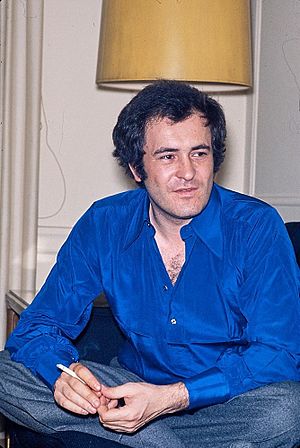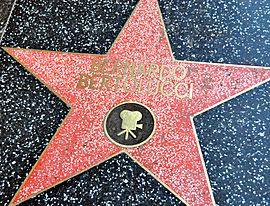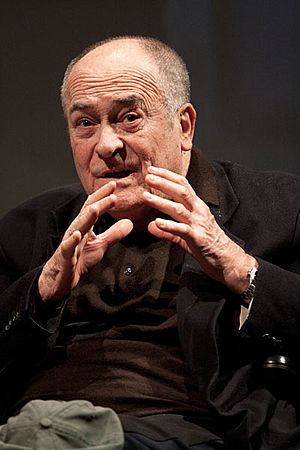Bernardo Bertolucci facts for kids
Quick facts for kids
Bernardo Bertolucci
|
|
|---|---|

Bertolucci, c. 1971
|
|
| Born | 16 March 1941 Parma, Italy
|
| Died | 26 November 2018 (aged 77) Rome, Italy
|
| Occupation |
|
| Years active | 1962–2018 |
| Spouse(s) |
|
| Parent(s) |
|
| Relatives |
|
| Awards | |
Bernardo Bertolucci (16 March 1941 – 26 November 2018) was a famous Italian film director and writer. His career lasted for 50 years. Many people thought he was one of the greatest directors in Italian cinema. His movies became very popular around the world.
Bertolucci was the first Italian filmmaker to win an Academy Award for Best Director. He won it for his movie The Last Emperor (1987). He also won many other awards, including two Golden Globes and a British Academy Award. In 2011, he received an honorary Palme d'Or award at the Cannes Film Festival. He had also received a Lifetime Achievement Golden Lion from the Venice Film Festival.
Bertolucci learned from the famous director Pier Paolo Pasolini. He made his first movie when he was 22 years old. His second film, Before the Revolution (1964), was praised by critics worldwide. It is now seen as a classic of Italian cinema. His 1970 film The Conformist is also considered a classic. His movies like the historical film 1900 (1976) and the family story La Luna (1979) were also well-known.
His 1987 film The Last Emperor told the life story of the Chinese emperor Puyi. This movie was a huge success. It won nine Oscars, including Best Picture and Best Director. After this, he made two more films in his "Oriental Trilogy": The Sheltering Sky and Little Buddha. His 1996 film, Stealing Beauty, was nominated for the Palme d'Or. He kept directing movies into the 21st century. His last film was Me and You in 2012.
Bertolucci's films often explored ideas about politics, history, and how different groups of people interact. His unique style influenced many other filmmakers. Several of his movies are on lists of the greatest films of all time.
Contents
Early Life
Bertolucci was born in Parma, a city in Italy. His mother, Ninetta, was a teacher. His father, Attilio Bertolucci, was a poet, art historian, and film critic. His mother was born in Australia.
Because he grew up in a creative family, Bertolucci started writing when he was 15. He won several important writing awards for his first book. His father's connections helped him get started in film. His father had helped director Pier Paolo Pasolini publish his first book. Pasolini then hired Bertolucci as his assistant in Rome for the film Accattone (1961).
Bernardo had a brother named Giuseppe Bertolucci, who was a theatre director. His cousin, Giovanni Bertolucci, was a film producer. Bernardo worked with Giovanni on several movies.
Career in Film
Becoming a Director
Bertolucci first wanted to be a poet, like his father. He studied literature at the University of Rome from 1958 to 1961. During this time, he began his film career as an assistant director to Pasolini. Bertolucci left the university without finishing his degree.
In 1962, at age 22, he directed his first full-length movie, La commare secca. It was a murder mystery that used flashbacks to solve the crime. His next film was the well-known Before the Revolution (1964).

Italian cinema faced challenges in the 1970s. Directors often worked with companies from other countries. Bertolucci became more famous with his films during this time. These included 1900 (1976), a long movie about farmers in Italy. It featured many international actors like Robert De Niro and Gérard Depardieu. He also directed La Luna (1979) and La tragedia di un uomo ridicolo (1981).
The Last Emperor and Later Films
In 1987, Bertolucci directed the epic film The Last Emperor. This movie told the life story of Puyi, the last emperor of China. A British producer, Jeremy Thomas, made the film independently. Bertolucci worked with him on most of his later movies. Bertolucci also helped write the film's script. He won the Academy Award for Best Director for this movie. The film used Puyi's life to show how China changed from old traditions to a new era.
At the 60th Academy Awards, The Last Emperor won all nine Oscars it was nominated for. These included Best Picture and Best Director.
The Last Emperor was the first movie ever allowed by the Chinese government to film inside the famous Forbidden City. Bertolucci had suggested this film to the Chinese government.
After The Last Emperor, Bertolucci made The Sheltering Sky and Little Buddha. He then returned to Italy to make films that explored his earlier themes. In 1996, he filmed Stealing Beauty. In 2003, he directed The Dreamers.
In 2007, Bertolucci received the Golden Lion Award at the Venice Film Festival for his life's work. In 2011, he also received the honorary Palme d'Or at the Cannes Film Festival.
His final film, Me and You, was shown at the 2012 Cannes Film Festival in 2012. It was released in the UK in 2013. The movie was based on a young adult book by Niccolò Ammaniti. Bertolucci helped write the script for the movie. He had wanted to film it in 3D, but it was too expensive.
In 2018, Bertolucci said he was planning a new film. He said the movie would be about love and how people communicate.
As a Writer and Producer
Bertolucci wrote many screenplays, which are the scripts for movies. He wrote scripts for his own films and for films directed by others. He also produced two films.
He also acted in one film called Golem: The Spirit of Exile in 1992.
Beliefs
Bertolucci's films often had strong political messages. He was a Marxist, which is a political belief system. Like other directors, he used his films to share his political ideas. His film The Conformist (1970) criticized fascism. It also explored ideas about countries and national pride. The film 1900 also looked at the struggles between different political groups.
Bertolucci supported the practice of Transcendental Meditation. He said it was a powerful experience, like watching a good movie.
Death
Bernardo Bertolucci passed away from lung cancer in Rome on 26 November 2018. He was 77 years old.
Awards
Film Awards
- 1971: National Society of Film Critics Award for Best Director
- 1973: Nastro d'Argento for Best Director
- 1987: Academy Award for Best Director (for The Last Emperor)
- 1987: Academy Award for Best Adapted Screenplay (for The Last Emperor)
- 1987: Golden Globe Award for Best Director (for The Last Emperor)
- 1987: Golden Globe Award for Best Screenplay (for The Last Emperor)
- 1987: David di Donatello for Best Director (for The Last Emperor)
- 1987: David di Donatello for Best Script (for The Last Emperor)
- 1987: Nastro d'Argento for Best Director (for The Last Emperor)
- 1987: Directors Guild of America Award for Best Director (for The Last Emperor)
- 1997: Honorable Mention at the Locarno International Film Festival
- 1997: Award for special visual sensitivity in directing at the Camerimage
- 1997: Award for collaborating director – director of photography (Vittorio Storaro) at Camerimage
- 1998: Recognition for free expression by the National Board of Review
- 1999: Life Time Achievement Award - 30th International Film Festival of India
- 2007: Golden Lion for his career at the Venice Film Festival
- 2011: Honorary Palme d'Or at Cannes Film Festival
Filmography
| Year | Title | Credited as | Notes | ||
|---|---|---|---|---|---|
| Director | Writer | Producer | |||
| 1962 | La Commare Secca | Yes | Yes | No | |
| 1964 | Before the Revolution | Yes | Yes | No | |
| 1967 | How to Win a Billion... and Get Away with It | No | Yes | No | |
| 1968 | Partner | Yes | Yes | No | Nominated - Golden Lion |
| Once Upon a Time in the West | No | Yes | No | ||
| 1969 | Amore e Rabbia | Yes | Yes | No | Segment: Agonia Nominated - Golden Bear |
| 1970 | The Conformist | Yes | Yes | No | Nominated - Academy Award for Best Adapted Screenplay Nominated - Golden Bear |
| The Spider's Stratagem | Yes | Yes | No | ||
| 1972 | Last Tango in Paris | Yes | Yes | No | Nominated - Academy Award for Best Director Nominated - Directors Guild of America Award for Outstanding Directing Nominated - Golden Globe Award for Best Director |
| 1976 | 1900 | Yes | Yes | No | |
| 1979 | La Luna | Yes | Yes | No | |
| 1981 | Tragedy of a Ridiculous Man | Yes | Yes | No | Nominated - Palme d'Or |
| 1987 | The Last Emperor | Yes | Yes | No | Academy Award for Best Director Academy Award for Best Adapted Screenplay BAFTA Award for Best Film César Award for Best Foreign Film David di Donatello for Best Director David di Donatello for Best Screenplay Directors Guild of America Award for Outstanding Directing Golden Globe Award for Best Director Golden Globe Award for Best Screenplay Nominated - BAFTA Award for Best Direction |
| 1990 | The Sheltering Sky | Yes | Yes | No | Nominated - Golden Globe Award for Best Director |
| 1993 | Little Buddha | Yes | Yes | No | |
| 1996 | Stealing Beauty | Yes | Yes | No | Nominated - David di Donatello for Best Director Nominated - Palme d'Or |
| 1998 | Besieged | Yes | Yes | No | Nominated - David di Donatello for Best Director |
| 2001 | The Triumph of Love | No | Yes | Yes | |
| 2002 | Ten Minutes Older: The Cello | Yes | Yes | No | Segment: Histoire d'eaux |
| 2003 | The Dreamers | Yes | No | No | |
| 2012 | Me and You | Yes | Yes | No | Nominated - David di Donatello for Best Film Nominated - David di Donatello for Best Director Nominated - David di Donatello for Best Screenplay |
| 2021 | The Echo Chamber | No | Yes | Yes | |
Documentary Features
| Year | Title | Credited as | Notes | |
|---|---|---|---|---|
| Director | Screenwriter | |||
| 1966 | Il canale | Yes | Yes | Documentary Short |
| 1971 | La salute è malata | Yes | No | |
| 1984 | L'addio a Enrico Berlinguer | Yes | Yes | |
| 1989 | 12 registi per 12 città | Yes | No | Segment: Bologna |
Honours
- Grand-Officer of the Order of Merit of the Italian Republic of Italy (Rome, 2 June 1988).
- Gold Medal of the Italian Medal of Merit for Culture and Art of Italy (Rome, 21 February 2001). This was for combining poetry and great cinema, and for showing different cultures and worlds in his films. It was also for representing the political and social history of the last hundred years.
- Master's Degree Honoris Causa in History and Criticism of Arts and Performance from the University of Parma. This was given because Bernardo Bertolucci is one of the most recognized filmmakers in the world. His movies have inspired many directors and entertained millions of viewers.
Images for kids
See also
 In Spanish: Bernardo Bertolucci para niños
In Spanish: Bernardo Bertolucci para niños
 | Dorothy Vaughan |
 | Charles Henry Turner |
 | Hildrus Poindexter |
 | Henry Cecil McBay |





